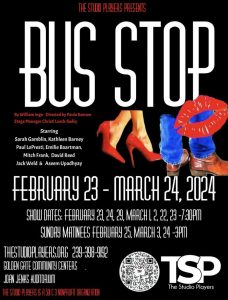‘Bus Stop’ a must-see slice of Midwest Americana
 Coming to the Joan Jenks stage in February is The Studio Players’ production of William Inge’s Bus Stop. The play juxtaposes three parallel stories of sexual attraction which independently explore the dichotomy between lust and love, longing and gratification.
Coming to the Joan Jenks stage in February is The Studio Players’ production of William Inge’s Bus Stop. The play juxtaposes three parallel stories of sexual attraction which independently explore the dichotomy between lust and love, longing and gratification.
Each “couple” is fraught with contradictions and complexities that Inge explores and resolves over the course of his comedy. The first is a cowpoke named Bo and the object of his obsession, a sweet but talentless saloon singer who calls herself Cherie. Bo suffers not only from inexperience, but caveman mentality. He’s intent on throwing his little angel over his shoulder and spiriting her away to his ranch in Montana, where she can keep his house and tend to his needs. Cherie also suffers from naivety, but hers stems from an overestimation of her ability to attain the stardom she thinks she deserves. Both find themselves at a crossroads between the life they want and the one that’s right there in front of them.
The second pairing involves a bright poetry-loving high school student named Elma who is waitressing at the diner and one of the bus’ passengers, a professor who is not only a drunk, but an alleged pedophile. The good doctor, Lyman, tips his hand during a scene in which the two re-enact a scene from Romeo and Juliet, in which he says ‘my name is hateful to myself.’ Unpopular with the boys at school because of her perennially high grades, this is the first time Elma has ever experienced being wanted by a man and she basks in the attention Dr. Lyman showers upon her. The play is set in the 1950s, so Chris Hansen will not be making an appearance at any point during the play.
The third couple is the diner’s owner, Grace, and Carl, the bus driver, who steal away during the night for a tryst upstairs. Both want more than a one-night stand, but can they give – and accept – what the other one wants and is capable of providing in exchange.
These contrasts and contraventions should be enough to induce you to take in the play. But if you’re still on the fence, then consider this. William Inge is often mentioned in the company of Tennessee Williams and Arthur Miller. In fact, before writing Bus Stop, Inge spewed out four hits in a row – Come Back Little Sheba, Picnic, The Dark at the Top of the Stairs and Splendor in the Grass. Picnic garnered a Pulitzer Prize. Splendor in the Grass earned an Academy Award. But as quickly as fame and fortune came, it abandoned him, and by the time he cranked the engine of his open-window car in the garage of his home at the age of 60, he’d already become America’s forgotten playwright.
The point is that Inge lived what he wrote. Like Dr. Lyman, Inge was an alcoholic. He was also closeted, cloistered, isolated and dysfunctional. His life was characterized by loneliness and longing. That, and so much more, is reflected in the characters, dialogue and wry humor built into the fabric of Bus Stop. And that makes this a must-see slice of Midwest Americana.
Go here for play dates, times and a cast list.
January 22, 2024.














 Tom Hall is both an amateur artist and aspiring novelist who writes art quest thrillers. He is in the final stages of completing his debut novel titled "Art Detective," a story that fictionalizes the discovery of the fabled billion-dollar Impressionist collection of Parisian art dealer Josse Bernheim-Jeune, thought by many to have perished during World War II when the collection's hiding place, Castle de Rastignac in southern France, was destroyed by the Wehrmacht in reprisal for attacks made by members of the Resistance operating in the area. A former tax attorney, Tom holds a bachelor's degree as well as both a juris doctorate and masters of laws in taxation from the University of Florida. Tom lives in Estero, Florida with his fiancee, Connie, and their four cats.
Tom Hall is both an amateur artist and aspiring novelist who writes art quest thrillers. He is in the final stages of completing his debut novel titled "Art Detective," a story that fictionalizes the discovery of the fabled billion-dollar Impressionist collection of Parisian art dealer Josse Bernheim-Jeune, thought by many to have perished during World War II when the collection's hiding place, Castle de Rastignac in southern France, was destroyed by the Wehrmacht in reprisal for attacks made by members of the Resistance operating in the area. A former tax attorney, Tom holds a bachelor's degree as well as both a juris doctorate and masters of laws in taxation from the University of Florida. Tom lives in Estero, Florida with his fiancee, Connie, and their four cats.